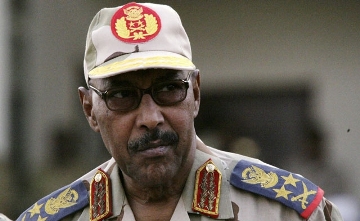Sudan ready to negotiate with SPLM-N rebels: official
March 20, 2013 (KHARTOUM) – The Sudanese minister of defence, Abdel-Rahim Mohammed Hussein, has disclosed that his government received a fresh letter from South Sudanese president Salva Kiir confirming disengagement with Sudanese rebels in the South Kordofan and Blue Nile states, pointing out that Khartoum and Juba have now both agreed to stop supporting rebel movements in the two countries.

The defence minister confirmed Khartoum’s new position that it is “ready to negotiate with the SPLM-N” but only based on the 2005 Comprehensive Peace Agreement (CPA).
Sudan has been strongly resisting regional and international pressure to negotiate with SPLM-N rebels calling its leaders outlaws and issuing arrest warrants for them.
The SPLM-N fought alongside the South during its protracted civil war with the north, with conflict flaring in 2011 between Khartoum and rebels fighting for the removal of the Arab-dominated regime.
South Sudan armed and trained SPLM-N when it was part of the South’s rebel force but maintains it cut all military ties before its independence in July 2011.
The United Nations Security Council (UNSC) resolution issued in May 2012 ordered Sudan and the SPLM-N to cooperate in order to end the conflict in the two regions.
Under the resolution, the two parties are supposed to negotiate on the basis of the 28 June 2011 agreement they signed in Addis Ababa before it was scrapped by Sudanese president Omer Hassan Al-Bashir.
Hussein hailed the recent deal with Juba, saying it “opened a new page” in relations between the two ex-foes.
Hussein noted that the two countries have agreed to create a buffer zone by withdrawing their respective forces 10 kilometres away from the contested borders, as well as establishing two mechanisms to monitor violations.
He explained that the first mechanism will monitor compliance with the implementation of the buffer zone agreement, while the second will monitor attacks carried out by one party against the other within a 40km distance spanning both sides of the border territory. The mechanisms will commence their work on the 24 March 24 and are due to report back on 26 March.
Both parties have also agreed to set up an international mechanism to look into complaints, with its membership to be selected after a meeting in Addis Ababa scheduled next April. Until then all complaints will be submitted to a joint committee comprised of military intelligence teams in both countries.
The parties have agreed to submit their respective proposals regarding the function and scope of the committee, which is to be discussed at a special meeting set by the African mediation team.
The agreement, which was distributed by the mediation team, stipulated that the new mechanism will deal with any concerns or complaints that may constitute a violation to the non-aggression agreement signed on 14 February 14 2012 and the joint cooperation accords signed on 27 September 27 2012, including harbouring or supporting rebel movements in the other country.
In September last year, both Sudan and South Sudan signed a series of cooperation agreements, which covered oil and citizenship rights, as well as security issues, among others. Earlier this month, the two countries signed an implementation matrix for these cooperation agreements.
(ST)
